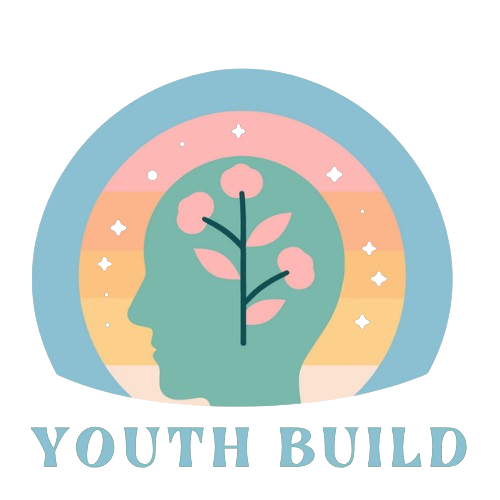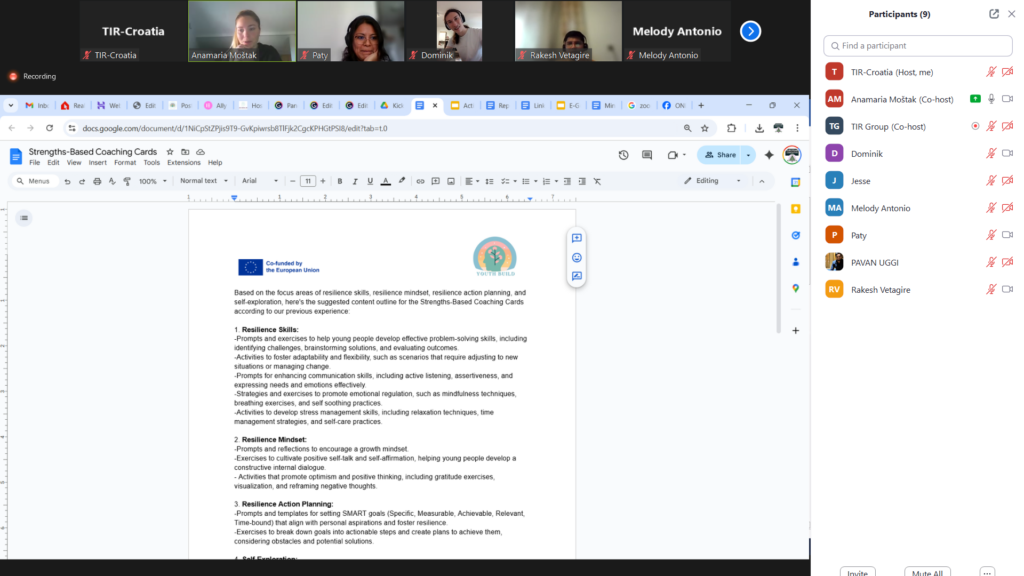Blog
Explore more about Youth Build

Focus Group Report: Developing the YOUTH BUILD Methodology

Estonia • Croatia • Poland
The YOUTH BUILD project has completed its first round of national focus groups in Estonia, Croatia and Poland. These discussions were an essential step in co-creating the project’s methodology and key outputs, including the Resilience Assessment Compass, Strengths-Based Coaching Cards, the Resilience Champions digital platform and training activities for youth workers.
The purpose of this phase was to understand real challenges faced by vulnerable youth, learn from experienced youth workers and gather practical recommendations that will shape future outputs.
1. Methodology
Approach:
• Semi-structured focus group discussions using open-ended questions
• Ethical standards applied in all three countries, including informed consent, anonymity and confidentiality
• Notes and reflective forms were completed to support thematic analysis
Participants:
• Estonia: 5 youth workers working directly with young people with intellectual disabilities
• Croatia: 5 youth workers working with vulnerable groups, including migrant youth, unemployed youth and socially excluded young people
• Poland: 12 participants involved in lifelong learning programmes, including educators, youth mentors and adult learners with experience supporting young people
2. Estonia: Youth Workers Supporting Intellectually Disabled Young People
Focus group format:
• Conducted online
• Duration: 60 minutes
• Participants: Youth workers providing support in inclusive education, community services, residential care and rural/urban youth programs
Key challenges identified:
• Low self-esteem caused by being treated as incapable or excluded from decision-making
• Emotional overload and difficulty regulating emotions due to communication barriers and sensory stress
• Lack of trust in adults and institutions, as young people are often ignored or not taken seriously
• Overprotection or exploitation, both limiting independence and agency
• Structural barriers in education, healthcare and employment
Skills and support needed:
• Emotional education and practical coping strategies using visual tools, routines and calm spaces
• Stable and respectful relationships with trained adults
• Supported independence, including life skills such as transport use, budgeting and decision-making
• Spaces that promote a positive disability identity and self-acceptance
• Opportunities to contribute, lead and be recognised for abilities, not limitations
3. Croatia: Youth Workers Supporting Vulnerable and Migrant Youth
Focus group format:
• Conducted either online or in person
• Participants: Experienced youth workers actively supporting marginalised youth, including migrants
Key challenges:
• Feelings of low self-worth and hopelessness due to exclusion from education and employment
• Emotional insecurity and difficulty trusting adults because of past experiences of neglect, family conflict or violence
• Exploitation and exhaustion, particularly among migrant youth working long hours under poor conditions
• Systemic discrimination based on ethnicity, nationality, gender or socio-economic status
• Youth taking adult responsibilities too early, leaving no time for personal development or education
Support needed:
• Crisis intervention and emotional counselling
• Consistent mentoring and trusted adult guidance
• Peer support groups to reduce isolation
• Opportunities for meaningful participation, leadership and decision-making
• Access to education, training and safe employment pathways
4. Poland: Participants in Lifelong Learning and Youth Work
Focus group format:
• Data gathered over two weeks during adult learning and youth support activities
• 12 participants actively contributed (educators, youth mentors, adult learners)
Key challenges:
• Isolation and lack of meaningful relationships, despite constant online connection
• Pressure from education and labour markets, fear of being left behind or not good enough
• Low resilience to social media influence and constant comparison
• Limited access to growth opportunities, such as scholarships or training
• Low sense of control over life decisions and declining motivation
Support needed:
• Practical coping skills: emotional regulation, stress management, problem-solving
• Stronger self-esteem and sense of identity
• Access to financial, educational and systemic support
• Mentoring and personalised coaching as the most effective form of support
5. Recommendations for the Resilience Assessment Compass
Across all three countries, youth workers and educators agreed that the Resilience Assessment Compass should measure the following areas:
• Emotional regulation
• Coping strategies used during stress
• Social support and relationships
• Self-confidence and belief in one’s abilities
• Hope and future orientation
Important design principles:
• Use strengths-based language
• Include clear, simple wording and visual aids
• Ensure accessibility (paper-based, digital and facilitated versions)
• Make it reflective rather than diagnostic or clinical
6. Strengths-Based Coaching Cards
All focus groups confirmed that Strengths-Based Coaching Cards would be a useful tool.
They help young people:
• Express thoughts and emotions in a safe, non-judgmental way
• Reflect on personal strengths, identity and future goals
• Engage in meaningful dialogue without pressure
Suggested themes include:
• Personal strengths
• Coping and resilience
• Belonging and identity
• Dreams and goals
7. Youth Leadership
Participants across all countries agreed that youth leadership should be an essential component of resilience-building. Young people should not only participate but also lead. This includes:
• Peer mentoring systems
• Youth-led workshops or activities
• Involvement in decision-making and programme design
• Recognition and celebration of youth contributions
Leadership helps build confidence, responsibility and a sense of belonging.
8. Next Steps
Based on the focus group findings, partners will now begin:
• Drafting the structure and content of the Resilience Assessment Compass
• Co-creating the first prototype of the Strengths-Based Coaching Cards
• Designing the methodology for piloting the tools with 30 youth workers and volunteers
• Preparing two online training sessions for youth professionals
Conclusion
The focus groups in Estonia, Croatia and Poland confirmed that resilience is not only a personal skill but also a product of environment, trust, identity and opportunity. The insights collected will ensure that all YOUTH BUILD tools are realistic, inclusive and shaped by those who understand youth needs best.
Check Other Posts

This project has been funded by the Erasmus+ Programme of the European Union (Project N. 2023-2-EE01-KA210-YOU-000168327).
The European Commission support for the production of this publication does not constitute an endorsement of the contents which reflects the views only of the authors, and the Commission cannot be held responsible for any use which may be made of the information contained therein.
